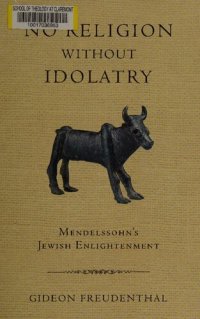
Ebook: No Religion without Idolatry: Mendelssohn's Jewish Enlightenment
Author: Gideon Freudenthal
- Year: 2012
- Publisher: University of Notre Dame Press
- Language: English
- pdf
Moses Mendelssohn (1725–1786) is considered the foremost representative of Jewish Enlightenment. In No Religion without Idolatry, Gideon Freudenthal offers a novel interpretation of Mendelssohn’s general philosophy and discusses for the first time Mendelssohn’s semiotic interpretation of idolatry in his Jerusalem and in his Hebrew biblical commentary. Mendelssohn emerges from this study as an original philosopher, not a shallow popularizer of rationalist metaphysics, as he is sometimes portrayed. Of special and lasting value is his semiotic theory of idolatry. From a semiotic perspective, both idolatry and enlightenment are necessary constituents of religion. Idolatry ascribes to religious symbols an intrinsic value: enlightenment maintains that symbols are conventional and merely signify religious content but do not share its properties and value. Without enlightenment, religion degenerates to fetishism; without idolatry it turns into philosophy and frustrates religious experience. Freudenthal demonstrates that in Mendelssohn’s view, Judaism is the optimal religious synthesis. It consists of transient ceremonies of a “living script.” Its ceremonies are symbols, but they are not permanent objects that could be venerated. Jewish ceremonies thus provide a religious experience but frustrate fetishism. Throughout the book, Freudenthal fruitfully contrasts Mendelssohn's views on religion and philosophy with those of his contemporary critic and opponent, Salomon Maimon. No Religion without Idolatry breaks new ground in Mendelssohn studies. It will interest students and scholars in philosophy of religion, Judaism, and semiotics.
"In this lucid and provocative study, Gideon Freudenthal offers an original and compelling reading of Mendelssohn as well as a defense of the possibility of religious rationalism more generally. This book is not only an excellent contribution to a growing body of scholarship on Mendelssohn and early modern philosophy, but it also significantly sharpens and advances contemporary conversations about the relations between religion and reason." ―Leora Batnitzky, Princeton University
"In this masterful study, Gideon Freudenthal demonstrates how Mendelssohn’s philosophy, including his philosophy of religion, is grounded in semiotics. The result is a landmark work that not only successfully challenges standard interpretations of Mendelssohn’s 'enlightened Judaism' and its alleged inconsistency but also effectively invites reconsideration of the very possibility of 'religion without idolatry.'" ―Daniel O. Dahlstrom, Boston University
"In focusing on Mendelssohn's 'semiotics of idolatry,' Gideon Freudenthal writes as a philosopher fully at home in multiple traditions: contemporary philosophy, eighteenth-century philosophy, Jewish biblical exegesis, and comparative religion. The result is a systematic and penetrating study, based on the Hebrew as well as the German texts, that engages Mendelssohn on perhaps the most critical issue of his understanding of religion with unprecedented philosophical rigor and imagination." ―David Sorkin, City University of New York Graduate Center
"In this lucid and provocative study, Gideon Freudenthal offers an original and compelling reading of Mendelssohn as well as a defense of the possibility of religious rationalism more generally. This book is not only an excellent contribution to a growing body of scholarship on Mendelssohn and early modern philosophy, but it also significantly sharpens and advances contemporary conversations about the relations between religion and reason." ―Leora Batnitzky, Princeton University
"In this masterful study, Gideon Freudenthal demonstrates how Mendelssohn’s philosophy, including his philosophy of religion, is grounded in semiotics. The result is a landmark work that not only successfully challenges standard interpretations of Mendelssohn’s 'enlightened Judaism' and its alleged inconsistency but also effectively invites reconsideration of the very possibility of 'religion without idolatry.'" ―Daniel O. Dahlstrom, Boston University
"In focusing on Mendelssohn's 'semiotics of idolatry,' Gideon Freudenthal writes as a philosopher fully at home in multiple traditions: contemporary philosophy, eighteenth-century philosophy, Jewish biblical exegesis, and comparative religion. The result is a systematic and penetrating study, based on the Hebrew as well as the German texts, that engages Mendelssohn on perhaps the most critical issue of his understanding of religion with unprecedented philosophical rigor and imagination." ―David Sorkin, City University of New York Graduate Center
Download the book No Religion without Idolatry: Mendelssohn's Jewish Enlightenment for free or read online
Continue reading on any device:

Last viewed books
Related books
{related-news}
Comments (0)